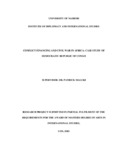| dc.contributor.author | Kinyua, Dolly | |
| dc.date.accessioned | 2017-12-14T11:38:48Z | |
| dc.date.available | 2017-12-14T11:38:48Z | |
| dc.date.issued | 2017 | |
| dc.identifier.uri | http://hdl.handle.net/11295/101926 | |
| dc.description.abstract | This Research analyzes and investigates the role of state and non-state actors in financing conflict in Africa. The research chose to analyze the conflict in the Democratic Republic of Congo because unlike any other African country DRC continues to suffer intractable conflicts that seems to have no end. The DRC conflict poses a significant threat to the stability of the continent and the world if left to continue as is. It is a known fact that DRC is strategically located at the center of Africa, this means that the risk of instability to the rest of Africa is imminent. The Domino effect of the war would create a serious crisis for Africa that could leave it vulnerable to destruction. The open truth is that the problem of one African nation becomes the probe of all African nations. If a sustainable solution is not found to stabilize DRC Africa should be prepared to deal with the consequences of which they are suffering to date. This research project examines how actors fund rebels and state officials in a bid to continuously destabilize the country for their own private commercial gains. The current body of knowledge explains that the conflict in DRC is mainly an issue of weak governance and greed proliferated by the resource curse theory. The research aims to bring a different dimension to this body of knowledge by examining the role of different actors in deliberately financing conflict in DRC. The specific objectives were to establish the role of the state and non-state and the use of booty futures as a catalyst to the conflict; to identify actors who contribute towards conflict finance in DRC and investigate ways and means in which conflict finance prolongs the war and to assess current and future international policies that can be utilized to leverage DRC from conflict and mineral exploration. The study used Political Economy theory to support and extend the existing knowledge on conflict finance because it is better placed to explain the growing commercialization of contemporary conflict that majorly arises from the extraction of lucrative natural resources for trade purposes, to attract revenue and favors for both sovereign states and non-state actors. The study is supported by a collection of both qualitative and quantitative data from multiple sources including literature review, interviews, observations and focus group discussions. The study established that DRC has experienced the worst conflict since World War II and has been named Africa’s First World War. The rich mineral resources have been argued to be the cause of this intractable war as ironic as it may sound. Furthermore, DRC hosts the largest United Nations peace keeping troops, and yet the war seems to only protract even in the fake face of current peace. This research argues that state heads transnational companies and intergovernmental organizations have played a role in fueling the conflict so as to reap the benefits of unregulated mineral trade. It is evident from the protracted conflict cycle and insecurity in eastern DRC that the conflict is increasingly dominated by economic interests rather than political motivations. As established by the study this has been done to deliberately create an unstable environment that ensures illegal exploitation of natural resources. The study recommends a call for consumers to take a lead and create a movement that will call for action against conflict mineral products and take a stand not purchase any products that have not been certified to be free from conflict minerals. UN agencies should increase their capacity building efforts to ensure previous and current development projects have been enforced and implemented. The government requires to take aggressive measures and put in place policies and laws that will provide the military will power to actively support the government and protect the country. The regional community needs to make a more deliberate effort to help DRC end the conflict and preserve peace. | en_US |
| dc.language.iso | en | en_US |
| dc.publisher | University of Nairobi | en_US |
| dc.rights | Attribution-NonCommercial-NoDerivs 3.0 United States | * |
| dc.rights.uri | http://creativecommons.org/licenses/by-nc-nd/3.0/us/ | * |
| dc.subject | Conflict Financing and Civil War in Africa: Case Study of Democratic Republic of Congo | en_US |
| dc.title | Conflict Financing and Civil War in Africa: Case Study of Democratic Republic of Congo | en_US |
| dc.type | Thesis | en_US |



